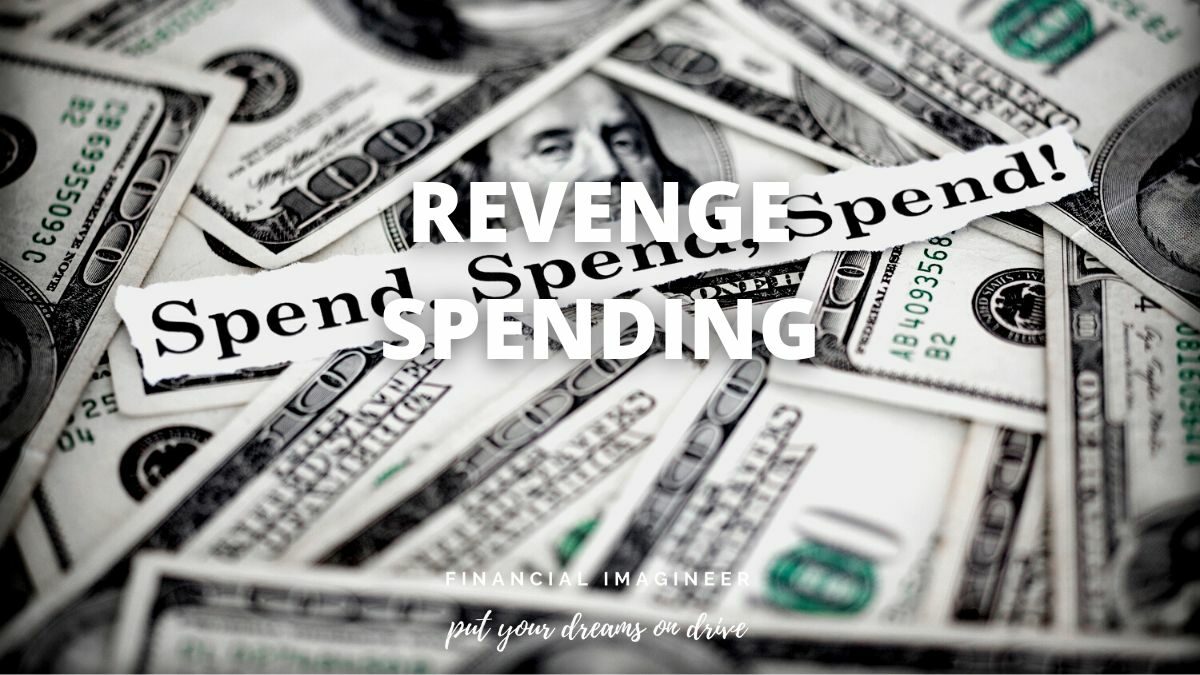It’s no secret that revenge spending has become a [post-pandemic] phenomenon, as people try to make up for what they believe they might have missed out on during the pandemic.
People are playing catch-up, trying to even the score on their deferred consumption. However, while revenge spending can be cathartic and temporarily rewarding, it can also have serious financial consequences if not managed properly.
Revenge spending can take many forms:
Such as catching up for yourself, getting even with your partner or family, or simply YOLO’ing your way through life.
Unfortunately, revenge spending doesn’t just lead to heightened inflation across the globe but it can also lead to serious financial consequences if not managed properly. It could even destroy potential generational wealth in families.
In this article, we’ll explore the implications of revenge spending and provide some tips on how to overcome it.
Are you ready to talk about revenge spending?
What Is Revenge Spending?
Revenge spending is a phenomenon characterized by impulsive and often excessive spending in an attempt to make up for what people believe they may have missed out on.
It is essentially an act of attempting to fill emotional voids with material items or experiences.
Revenge spending can take form in expensive vacations, luxury purchases, extravagant dates, etc., and it has become increasingly popular over the past year [mainly due to the uncertainty caused by the pandemic].
“This attitude can fuel a habit: “revenge spending,” which, as the name says, is shopping to get back at someone or something that wrongs us — like a job layoff, slumping economy, relationship strife, even a global trauma like the pandemic.”
Dr. Juli Fraga
Revenge spending has both short and long-term implications for not just individuals but for entire economies as well.
Revenge spending can contribute to inflationary pressures in an economy [if it goes unchecked] especially when such expenditures are not backed by income stability or wealth.
In addition, revenge spending also has long-term implications for affected individuals.
It can turn into monetary downward spirals!
Post Pandemic Revenge Spending
In the past two years, revenge spending has become some sort of “post-pandemic phenomenon” that has been popping up around the world.
People are indulging in revenge spending on all kinds of things in an attempt to catch up on what they believe to have missed out on during the pandemic.
It’s almost like the big Marshmallow Test unwind!
Some may splurge on luxury items such as designer handbags, jewelry, expensive watches, and cars. Others may spend money on lavish vacations to exotic locations or expensive trips to places they haven’t been to before. There have even been cases of revenge spending on home renovations, furniture pieces, and electronics.
Revenge spending is a creative fellow!
People are also trying to make up for missing out on experiences by going on extravagant dates or engaging in activities that provide immediate gratification such as shopping sprees or going to the spa for treatments.
In a nutshell, a lot of money has been pumped back into an economy short of supply and labor.
This behavior has caused something now widely known as inflation.
Catch-up Revenge Spending
Revenge spending is contagious and not just a phenomenon occurring in the aftermath of pandemics. Revenge spending is also when someone, usually in a joint account with their partner, spends money as a way of getting back at them – whether it’s retribution for bad behavior or just an attempt to get even as the partner has also indulged.

Just imagine:
It’s the day after payday and your joint account has just been nicely filled with one (or two) fresh new salaries! But then you check your account, and hey, what’s that? You see how your partner just bought him/herself a new phone, a gaming console, a pair of luxury shoes or an expensive handbag [* fill your item of choice here].
You just felt great to have earned another month of income but now, seeing that this money is being used, you feel like you’re missing out.
As you’ve seen how much your partner spent, you feel the urge to spend money for yourself as well and secretly decide you’ve also “earned” and “deserved” to reward yourself with something, just to “break-even”!
Before you know it, you’ve engaged in what I like to call “catch-up revenge spending”!
Sounds familiar?
YOLO Revenge Spending
The YOLO attitude (You Only Live Once) is often linked to this type of behavior and leads some people to be careless with their money.
Have you ever had one of the following thoughts?
- It’s only money, so why not get that thing I’ve been eyeing?
- Hey, I’ve survived the pandemic, let’s go spend some money!
- Let me treat myself – I deserve it! We only live once, might as well enjoy the ride.
- Inflation is creeping higher, let’s spend this money before it loses more of its value!
I’m not opposed to enjoying your life and treating yourself. However, please bear in mind what “future you” will think of you 5, 10, or 20 years from now.
“Satisfying revenge spending in the moment can mean missing out on valuable opportunities for investing and building a solid financial future in the long run.”
Just think of what kind of life you could set yourself up with your savings by investing instead!
Potential Risks of Revenge Spending on Generational Wealth
Third-generation wealthy families at times do have tendencies for “generational revenge spending”.
They play catch up on the deferred spending [of their parents and grandparents] and compensate for missed-out attention, time, and love. And by doing so, they [unknowingly] destroy ongoing generational wealth.
This is one of the reasons why wealth doesn’t last.
“Revenge spending is a slippery slope that can lead to long-term financial instability and destroy potential generational wealth.”
So, what to do against it?
Pay Yourself First
It is essential to put your money to work instead of having it sit around idle, waiting to be spent!
Hence, the easiest way to counter any form of potential [overindulding] revenge spending is to have a pre-defined amount of cash being auto-forwarded to your savings and/ or investment account whenever your salary hits your account.
Prioritize your future self and family, and have a financial goal and plan in place.
And automate it!
Whether you’re saving/ investing for a home downpayment, retirement or just an emergency fund to cover any unexpected expenses, make sure your savings are set aside before you and your loved ones get a chance to revenge spend!
Redirecting Dopamine from Shopping to Other Activities
Retail therapy?
Really?
Unfortunately, chances are those who read till here are not the ones who should be reading this.
If you are someone who would never fall into the retail therapy trap but know others who might:
Please help them by forwarding this article, it might be helping to raise financial literacy and awareness!
“Rather than revenge spending, why not redirect that “dopamine rush” from shopping to other activities such as investing?”
Investing is an excellent way to maximize your money and grow it over time.
It can also be a great source of entertainment – especially if you’re someone who loves understanding market trends and learning about the stock market.
There’s nothing more satisfying than watching your money grow!
You might even get addicted to this…
Let me ask you:
If you could choose, what addiction would you prefer?
Investing is just one counterintuitive proposal of mine here. Of course, there are many more activities that could replace your hunger for dopamine instead!
Consulting a Financial Coach For Help with Money Management
If you feel that revenge spending is something you can’t control on your own, please do consider seeking help from a financial coach.
Financial coaching is not the same as traditional financial advice. A financial coach will work with you one-on-one to help you understand your unique relationship with money. Together as a team you can create a plan to change your behavior.
“Financial coaching is not the same as traditional financial advice and it can help you understand your unique relationship with money and create a plan to change your behavior.”
A financial coach can make sure you stay accountable and that you [as an individual or as a couple] don’t fall back on revenge spending. Financial coaches can also help you develop a strategy to manage your money more effectively – so revenge spending becomes less of an issue in the long run.
Consider revenge spending as a warning sign, don’t let it ruin your relationship with your loved ones!
Feel free to book a free 30-minute session with me here
Final Thoughts
If you’re struggling with revenge spending, try some tips that can help you get back on track such as saving money first, redirecting your dopamine from buying things to other activities like investing or others, and consulting a financial coach who can provide advice on how to manage your finances better.
“Revenge spending can be insidious, as it often robs people of potential financial stability and generational wealth without them even realizing it.”
Remember, revenge spending can be financially destructive for individuals, couples, and families over generations alike. Don’t let it ruin your relationship with your loved ones!
Start taking steps today to get out of the revenge spending cycle.
Give your money a job before indulging in anything impulsively. Doing so will not only help you to save more money, but it will also help you build a better financial future.
Ultimately, it will help us all get inflation down again!
Good luck and be profitable,
Matt
WAIT A SECOND!
If you liked this post, please help me pay it forward by sharing it with your family and friends and don’t forget to subscribe to Financial Imagineer via email in the box below, give me a follow on Twitter, Facebook and/ or Medium [where I post daily]!
If you’re looking to get your money skills “up to speed”, check out my online course or feel free to book 30-minute consultation with me via Zoom.

Disclaimer: This article is intended to provide general information and does not constitute financial advice. It is important to seek the counsel of a professional, such as a financial advisor or coach, for any specific questions about your personal situation.

